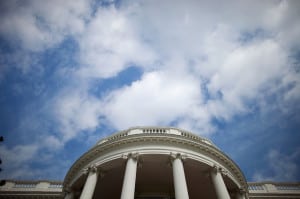Latest News
[Via Satellite 05-11-2016] U.S. President Barack Obama’s Office of Science and Technology Policy (OSTP) is proposing legislation that would provide a narrowly-tailored authorization process for newly-contemplated and pioneering commercial space activities. In an April 4 report to Congress, OSTP said this authorization process would only contain conditions necessary for compliance with the nation’s international obligations like the 1967 Outer Space Treaty, foreign policy and national security interests, and protection of federal government uses of outer space.
Through its “mission authorization” framework, OSTP does not seek to establish a comprehensive regulatory framework for outer space activities like launch services, satellite communications and remote sensing, which are regulated by the Federal Aviation Administration (FAA), the Federal Communications Commission (FCC) and the National Oceanic and Atmospheric Administration (NOAA). Instead, OSTP believes the proposed legislation is intended to establish a process no more burdensome than is necessary to enable the federal government to authorize pioneering space activities in conformity with its treaty obligations and to safeguard core public interests such as national security. These pioneering space activities include transportation of commercial payloads to the lunar surface, operation of a commercial lunar habitat, end-of-life extension modules, satellite refueling using fuels derived from space resources, and mining the moon or asteroids for rare-earth elements.
OSTP said the mission authorization proposal is closely modeled on the FAA’s payload review process, in that the FAA would coordinate an interagency process in which designated agencies would review a proposed mission in relation to specified government interests. For example, the U.S. Department of State would be responsible for reviewing proposed missions for consistency with the Outer Space Treaty and would recommend authorization conditions only as necessary to ensure conformity with the provisions of this treaty.
OSTP believes the mission authorization proposal would preserve the competitiveness of the U.S. launch industry. At present, federal government review processes tied to the launch licensing framework, such as the payload review process, are limited to payloads launched from the United States. OSTP said these processes serve as a disincentive for purchasing launch services from U.S. providers to the extent payload owners perceive these existing processes as presenting regulatory risk or inconvenience.
Commercial space advocate and industry consultant Rand Simberg said May 5 that OSTP’s approach seems reasonable, for now, and that it was nice to see that providing this licensing framework was not a partisan issue. Simberg said his fear is that the Department of State will place a higher priority on placating international critics of the asteroid mining law, many, he said, who want the U.S. to sign the Moon Treaty, as opposed to enabling U.S. space miners.
The 2015 Commercial Space Launch Competitiveness Act (CSCLA), which tackles a number of important issues like spurring private aerospace competitiveness and entrepreneurship, commercial remote sensing and space resource exploration and utilization, required the April 4 report to Congress. The act said it was designed to facilitate a pro-growth environment for developing commercial space industry by encouraging private sector investment and creating more stable and predictable regulatory conditions.
One congressional stakeholder believes the lack of regulatory framework for launch is preventing the pioneering commercial space industry from getting off the ground. At a Secure World Foundation event in Washington, D.C. Thursday May 5, Christopher Ingraham, senior legislative assistant for Rep. Jim Bridenstine, R-Okla., said Bridenstine’s office has heard from the Department of State that it does not feel it has the mechanisms to ensure that more non-traditional activities like resource extraction are in compliance with international treaty obligations. Ingraham said the FAA and other agencies have informed many companies that they might not be able to get a launch license because their planned missions do not fit neatly into current procedures that license launch and approve payloads.
As a result, Ingraham said Bridenstine’s office has been working to modify the administration’s proposal and settled on a proposal that takes into account OSTP’s concerns while providing a “light touch” that is acceptable to industry. Ingraham said Bridenstine’s proposal would allow federal agencies like the state and defense departments the ability through FAA to say what payloads need to do to comply with international treaty obligations. Ingraham also said an early version of this proposal is in Bridenstine’s comprehensive American Space Renaissance bill, and that Bridenstine is “really close” to an agreement with industry and has already started having discussions with federal agencies including the Department of State, FAA, DoD and OSTP about this language. Ingraham added that this bill language is a “top priority” for Bridenstine and a few other lawmakers and that it is a main goal to find a legislative vehicle for this language to get it done before this session of Congress ends.
The original version of this story was published on Defense Daily, a Via Satellite sister publication covering the global defense market intelligence in land, sea, air, and space initiatives.
Get the latest Via Satellite news!
Subscribe Now